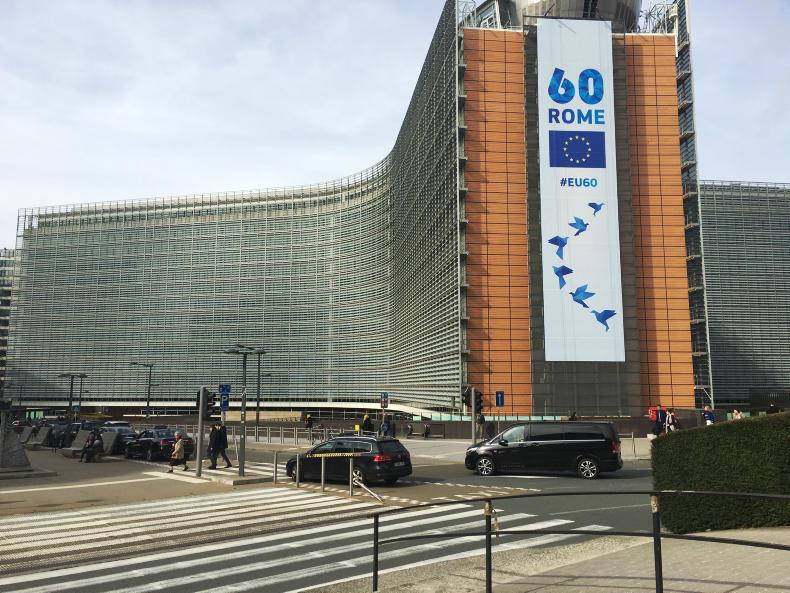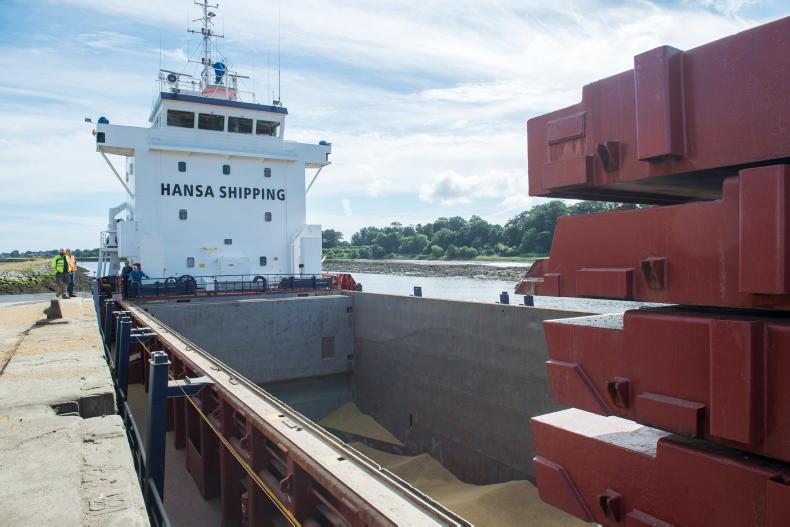Throughout the financial crisis, it was always felt that Ireland was harshly treated by the EU in relation to the terms of the bailout. While the passage of time has done nothing alter public opinion, the notion that we should join the UK and leave the EU has gained no traction – other than among those with narrow political interests. Common sense continues to prevail within the public consensus and along with it the realisation that our open economy has benefited greatly from being at the core of the EU.
Nevertheless, with the UK this week formally commencing the process of leaving the EU, Brussels cannot ignore the extent to which an EU that does not afford unrestricted access to the UK market presents a very different economic landscape for Ireland. There is no other member state as exposed to fallout from Brexit as Ireland. So deep are the trading links between the two markets that a 1% shift in GDP in the UK affects Irish GDP to the tune of 0.3%.
Within this, no Irish sector is as exposed to the fallout from Brexit as agriculture – our largest indigenous sector, generating 13-15% of total employment. The UK consumes 40% of total Irish food exports, 250,000 tonnes of beef and 90,000 tonnes of cheddar cheese per annum – any change to the trading relationship that leads to increased costs or reduces the competitiveness of Irish exports to the UK will have severe consequences for the Irish economy.
Many had moved to play down such a scenario in the immediate aftermath of the Brexit vote. But in light of the intention signalled by Theresa May in January to remove the UK from both the single market and the customs union, such an outcome appears almost inevitable.
Of course, an even more damaging scenario for Irish agriculture and the Irish economy is one where no deal is achieved between the UK and EU at the end of the two years of negotiations. It is now widely accepted that such a move would see the UK default to a WTO option. This would be devastating for Ireland, as outlined in a recent ESRI report.
As Phelim O’Neill details on pages 14-15, the ESRI report shows that Ireland – despite only accounting for 5% of EU trade with the UK – would carry 20% of Europe’s total WTO tariff burden, which largely reflects the 50%-plus tariffs imposed across a range of meat and dairy products.
Germany, despite accounting for 28% of total EU exports to the UK, would carry a burden of just 18%, reflecting the lower tariff rate applied to automobiles.
Worryingly for Ireland, the ESRI analysis shows that if no agreement is reached and the UK defaults to a WTO option, it would have little or no impact on 20 of the 27 member states, with the seven remaining states picking up 83% of the costs of increased tariffs. Clearly some member states will have a lot more skin in the game in the negotiations.
So, how should Ireland and Europe respond? Despite the burden of potential WTO tariffs being shared between seven countries, the response should be at a product category level and not national level. It is not about making a special case for Ireland, France or Belgium – it has to be about recognising the impact of punitive tariffs on categories such as beef, cheese, wine and chocolate. By supporting the category, exporters from across the EU 27 are equally protected, whether it is a small Irish chocolate maker, a French, Spanish or Italian wine merchant or an Irish or Dutch meat exporter. Targeting supports to product categories removes any idea of a national support mechanism that favours one country over another.
While we advocate the case for EU support be made on a category basis, as affected by WTO tariffs, there will of course be a political dimension. Ireland has shown steadfast commitment to the EU. Now is the time for the EU to show the same commitment to Ireland. An EU that values Ireland’s participation will:
Move to protect the Irish economy from price shocks in the next two years due to currency volatility.Ensure that a deal is achieved that not only maintains unrestricted access for agricultural produce to the UK market, but ensures the UK is required to adhere to equivalence of standards on all imports.Reach a political solution to the unique challenge Ireland faces in relation to the north-south border.Give a commitment that should negotiations fail and we are left with an outcome that will adversely impact on a particular sector or member state, market support tools will be triggered to underpin economic activity and prices until alternative markets can be found.While Ireland remains a steadfast supporter of the EU, the EU must realise that Brexit has the potential to leave the Irish economic model unsustainable. It is difficult to see how such a scenario would not create a shift in the Irish attitude.
Throughout the financial crisis, it was always felt that Ireland was harshly treated by the EU in relation to the terms of the bailout. While the passage of time has done nothing alter public opinion, the notion that we should join the UK and leave the EU has gained no traction – other than among those with narrow political interests. Common sense continues to prevail within the public consensus and along with it the realisation that our open economy has benefited greatly from being at the core of the EU.
Nevertheless, with the UK this week formally commencing the process of leaving the EU, Brussels cannot ignore the extent to which an EU that does not afford unrestricted access to the UK market presents a very different economic landscape for Ireland. There is no other member state as exposed to fallout from Brexit as Ireland. So deep are the trading links between the two markets that a 1% shift in GDP in the UK affects Irish GDP to the tune of 0.3%.
Within this, no Irish sector is as exposed to the fallout from Brexit as agriculture – our largest indigenous sector, generating 13-15% of total employment. The UK consumes 40% of total Irish food exports, 250,000 tonnes of beef and 90,000 tonnes of cheddar cheese per annum – any change to the trading relationship that leads to increased costs or reduces the competitiveness of Irish exports to the UK will have severe consequences for the Irish economy.
Many had moved to play down such a scenario in the immediate aftermath of the Brexit vote. But in light of the intention signalled by Theresa May in January to remove the UK from both the single market and the customs union, such an outcome appears almost inevitable.
Of course, an even more damaging scenario for Irish agriculture and the Irish economy is one where no deal is achieved between the UK and EU at the end of the two years of negotiations. It is now widely accepted that such a move would see the UK default to a WTO option. This would be devastating for Ireland, as outlined in a recent ESRI report.
As Phelim O’Neill details on pages 14-15, the ESRI report shows that Ireland – despite only accounting for 5% of EU trade with the UK – would carry 20% of Europe’s total WTO tariff burden, which largely reflects the 50%-plus tariffs imposed across a range of meat and dairy products.
Germany, despite accounting for 28% of total EU exports to the UK, would carry a burden of just 18%, reflecting the lower tariff rate applied to automobiles.
Worryingly for Ireland, the ESRI analysis shows that if no agreement is reached and the UK defaults to a WTO option, it would have little or no impact on 20 of the 27 member states, with the seven remaining states picking up 83% of the costs of increased tariffs. Clearly some member states will have a lot more skin in the game in the negotiations.
So, how should Ireland and Europe respond? Despite the burden of potential WTO tariffs being shared between seven countries, the response should be at a product category level and not national level. It is not about making a special case for Ireland, France or Belgium – it has to be about recognising the impact of punitive tariffs on categories such as beef, cheese, wine and chocolate. By supporting the category, exporters from across the EU 27 are equally protected, whether it is a small Irish chocolate maker, a French, Spanish or Italian wine merchant or an Irish or Dutch meat exporter. Targeting supports to product categories removes any idea of a national support mechanism that favours one country over another.
While we advocate the case for EU support be made on a category basis, as affected by WTO tariffs, there will of course be a political dimension. Ireland has shown steadfast commitment to the EU. Now is the time for the EU to show the same commitment to Ireland. An EU that values Ireland’s participation will:
Move to protect the Irish economy from price shocks in the next two years due to currency volatility.Ensure that a deal is achieved that not only maintains unrestricted access for agricultural produce to the UK market, but ensures the UK is required to adhere to equivalence of standards on all imports.Reach a political solution to the unique challenge Ireland faces in relation to the north-south border.Give a commitment that should negotiations fail and we are left with an outcome that will adversely impact on a particular sector or member state, market support tools will be triggered to underpin economic activity and prices until alternative markets can be found.While Ireland remains a steadfast supporter of the EU, the EU must realise that Brexit has the potential to leave the Irish economic model unsustainable. It is difficult to see how such a scenario would not create a shift in the Irish attitude.









SHARING OPTIONS